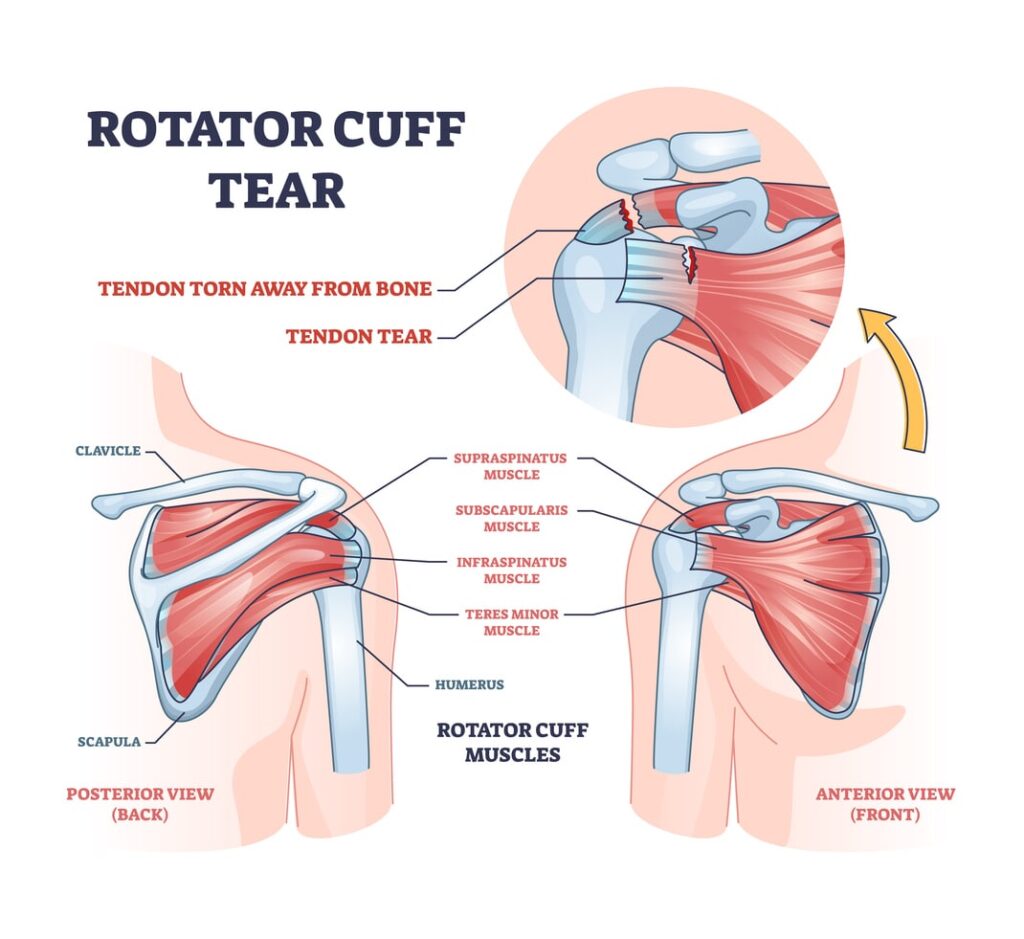Rotator cuff injuries can significantly impact a person’s ability to move freely and enjoy everyday activities. Dr. Peter Howard is committed to using the latest advancements in surgical care to restore mobility and quality of life. That’s why we rely on Tetrous, an innovative and highly effective tool explicitly designed for rotator cuff repairs. Incorporating this cutting-edge technology into our procedures, we’re helping patients achieve faster recoveries and more durable outcomes.

What Is Tetrous?
opens in a new windowTetrous is a regenerative medicine company focused on developing methods that enhance healing at the tendon-to-bone interface. Their advanced technology is specifically designed to support the repair of rotator cuff injuries by optimizing the healing process where tendons meet bone. Tetrous products utilize cutting-edge materials and a specialized design to promote tissue regeneration and improve long-term recovery. This approach supports faster healing times, enhances fixation strength, and promotes durable shoulder function post-surgery.
Traditional methods for treating rotator cuff injuries can sometimes fall short, providing insufficient support or putting patients at risk for re-injury. Tetrous offers a solution to these challenges with its regenerative approach, delivering an advanced anchoring system that improves the chances of successful recovery. With Tetrous, patients benefit from smoother healing, improved shoulder strength, and enhanced mobility.
Who Might Need Tetrous in Their Treatment?
If you’re dealing with a severe rotator cuff injury that hasn’t improved with non-surgical treatments like physical therapy or injections, surgery may be the next step—and Tetrous could be an essential part of your recovery. These types of injuries often affect people who:
- Perform repetitive overhead motions like athletes, construction workers, or painters.
- Suffer a sudden accident, like falling or experiencing a direct hit to the shoulder.
- Are older, as wear and tear on tendons naturally occur with age.
Tetrous is especially helpful for complex rotator cuff injuries or significant tendon damage cases. This tool offers strong and dependable support for the repaired tendons, helping to restore shoulder strength and mobility while lowering the risk of future complications.
Symptoms of Rotator Cuff Tears
Rotator cuff tears can vary in severity, ranging from partial tears to complete ruptures. Common symptoms include:
- Shoulder pain: Often described as a dull ache that worsens with movement or at night.
- Weakness: Difficulty lifting objects or performing tasks that involve overhead motion.
- Limited range of motion: Stiffness or an inability to move the arm freely.
- Popping or clicking sounds: Sensations that occur during shoulder movement.
If left untreated, these symptoms can worsen over time, leading to chronic pain and functional limitations. Early diagnosis and appropriate treatment, including the use of Tetrous, can prevent further damage and facilitate recovery.
Causes of Rotator Cuff Tears
Rotator cuff tears can happen for several reasons, and understanding these causes can help you prevent injuries or catch them early. Many tears result from repetitive overhead movements, which is why athletes in sports like baseball, tennis, or swimming are more at risk. Tears can also develop over time due to normal wear and tear as you age or from sudden injuries, such as falling and landing on an outstretched arm.
Everyday habits, like poor posture or weak shoulder muscles, can also increase your chances of a tear. By recognizing these risk factors, you can protect your shoulders—such as strengthening the muscles around your shoulder, avoiding repetitive strain, and talking with Dr. Howard if you experience pain or discomfort.
What to Expect Before Surgery
Preparing for rotator cuff repair surgery involves several steps to ensure a smooth procedure and optimal outcomes. Here’s what patients can typically expect:
1. Consultation and diagnosis:
- A thorough evaluation by Dr. Howard, including physical exams, imaging tests (MRI or ultrasound), and a discussion of symptoms.
- Determination of whether surgery is necessary and if Tetrous will be used.
2. Pre-surgical preparations:
- Instructions on medications, fasting, and activity restrictions.
- Preoperative physical therapy to strengthen the shoulder and improve post-surgical recovery.
3. Discussion of the surgical plan:
- The surgeon will explain the procedure, the role of Tetrous in the repair, and expected outcomes.
What to Expect After Surgery
Recovery from rotator cuff repair surgery requires time, commitment, and a structured rehabilitation plan. Post-surgical care is made up of:
1. Immediate postoperative period:
- Pain management using prescribed medications and cold therapy.
- Immobilization of the shoulder with a sling to protect the repair.
2. Rehabilitation:
- A progressive physical therapy program starting with gentle passive movements, eventually advancing to active exercises and strength training.
- Regular follow-ups with the surgeon to monitor healing and progress.
3. Expected outcomes:
- Most patients regain significant shoulder function, and experience reduced pain within 4-6 months.
- Tetrous contributes to a more stable repair, reducing re-tearing risk and improving overall recovery.
Benefits of Using Tetrous for Rotator Cuff Repairs
The Tetrous system offers unique advantages over traditional techniques. Its innovative design supports stronger and more reliable repairs, reducing the risk of complications. The system allows surgeons to address various tear severities, making it a versatile option for different patient needs. Patients who undergo procedures using Tetrous often experience faster recovery times and improved outcomes, allowing them to return to their daily activities sooner.
By improving surgical precision and repair integrity, Tetrous can also enhance long-term joint stability. This means patients are less likely to face recurring issues or require additional surgeries.
Non-Surgical Options for Rotator Cuff Tears
While Tetrous is used for surgical repairs, non-surgical treatments can often be the first step in addressing a rotator cuff injury. Not all tears require surgery, and many patients can manage their symptoms effectively without it. Physical therapy, anti-inflammatory medications, and cortisone injections can help reduce pain and improve shoulder movement, especially for minor or partial tears.
Sometimes, simple lifestyle adjustments—such as avoiding activities that put too much strain on the shoulder—can also support healing and prevent further injury. However, Tetrous is a proven solution for severe or full-thickness tears that ensures a stronger and more reliable surgical repair for long-term results.

Contact Dr. Howard for Care
If you’re dealing with the pain and limitations of a rotator cuff injury, Dr. Peter Howard is here to help. Using advanced tools like Tetrous, Dr. Howard provides effective, reliable solutions for rotator cuff repairs. With his expertise and commitment to patient care, you can trust that you’re in capable hands.
Don’t let shoulder pain hold you back any longer. Schedule an appointment with Dr. Howard today to explore your treatment options and take the first step toward recovery.